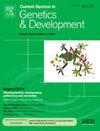Paternal effects on telomere integrity during the sperm-to-embryo transition
IF 3.6
2区 生物学
Q2 CELL BIOLOGY
引用次数: 0
Abstract
Telomeres are essential nucleoprotein structures that preserve our terminal DNA sequence and protect chromosome ends from fusion. Our vast knowledge of telomeres comes almost entirely from studies of healthy and diseased somatic cells. However, building evidence suggests that the molecules and mechanisms required for telomere integrity in somatic cells are insufficient to preserve telomere integrity during the sperm-to-embryo transition. Here, we review this growing body of work on telomere ‘paternal effects’, wherein zygotic telomere integrity is determined not by the genotype of the zygote but instead by the genotype of the father. Direct inheritance of sperm-specific proteins establishes paternal telomere epigenetic identity, while direct inheritance of sperm telomere length contributes to telomere length inheritance. Together, these investigations of telomere integrity through the sperm-to-embryo transition reveal potent paternal effects on zygotic telomere functions, with implications for human infertility.
精子到胚胎转变过程中,父系对端粒完整性的影响
端粒是保存我们的末端DNA序列和保护染色体末端免于融合的基本核蛋白结构。我们对端粒的大量知识几乎完全来自对健康和患病体细胞的研究。然而,越来越多的证据表明,体细胞端粒完整性所需的分子和机制不足以在精子到胚胎的转变过程中保持端粒完整性。在这里,我们回顾了不断增长的端粒“父系效应”研究,其中合子端粒的完整性不是由合子的基因型决定的,而是由父亲的基因型决定的。精子特异性蛋白的直接遗传建立了父本端粒表观遗传身份,而精子端粒长度的直接遗传有助于端粒长度遗传。总之,这些通过精子到胚胎转变的端粒完整性的研究揭示了父亲对合子端粒功能的强大影响,对人类不育具有启示意义。
本文章由计算机程序翻译,如有差异,请以英文原文为准。
求助全文
约1分钟内获得全文
求助全文
来源期刊
CiteScore
7.90
自引率
0.00%
发文量
102
审稿时长
1 months
期刊介绍:
Current Opinion in Genetics and Development aims to stimulate scientifically grounded, interdisciplinary, multi-scale debate and exchange of ideas. It contains polished, concise and timely reviews and opinions, with particular emphasis on those articles published in the past two years. In addition to describing recent trends, the authors are encouraged to give their subjective opinion of the topics discussed.
In Current Opinion in Genetics and Development we help the reader by providing in a systematic manner:
1. The views of experts on current advances in their field in a clear and readable form.
2. Evaluations of the most interesting papers, annotated by experts, from the great wealth of original publications.[...]
The subject of Genetics and Development is divided into six themed sections, each of which is reviewed once a year:
• Cancer Genomics
• Genome Architecture and Expression
• Molecular and genetic basis of disease
• Developmental mechanisms, patterning and evolution
• Cell reprogramming, regeneration and repair
• Genetics of Human Origin / Evolutionary genetics (alternate years)

 求助内容:
求助内容: 应助结果提醒方式:
应助结果提醒方式:


